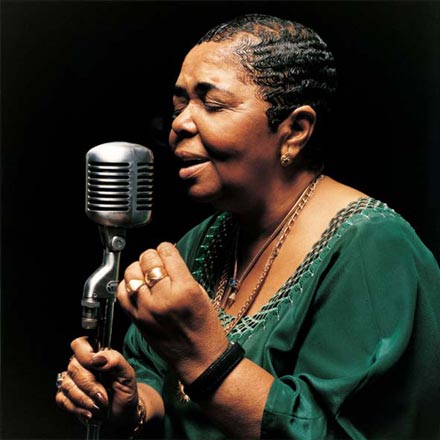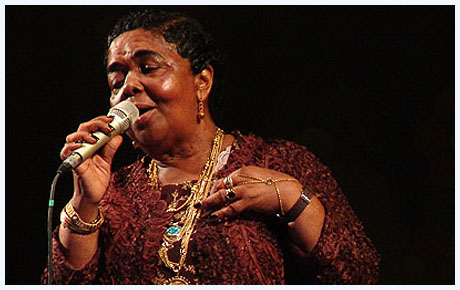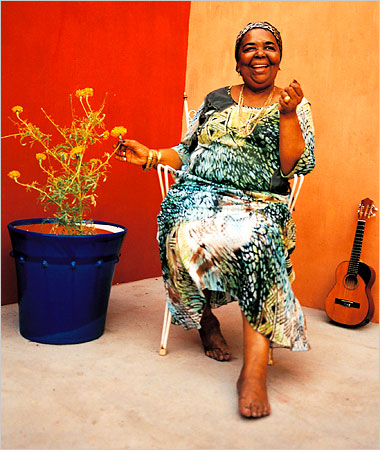CESARIA EVORA / “Negue”
"Morna is like the blues because it is a way to express life's suffering in music."

Born on August 27, 1941 in the small port of Mindelo on the Cape Verde island of Sao Vicente, Cesario Evora is an internationally-lauded folk hero of the small collection of islands that comprise Cape Verde. Although she has recorded in France and in Cuba, her music remains firmly rooted in the culture of Lusophone West Africa.
The language is Portuguese and Creole, the style of music is “morna,” “coladeras,” and other traditional rhythms and genres but the feeling is the familiar sadness we in America know as the blues—Cape Verdeans have “sodade.”
Cesaria Evora is the master of “morna.” If she were to sing “Happy Birthday” it could make you cry thinking about all of the suffering you have seen in life and simultaneously encourage you to wipe away the tears and go on living - after all suffering is a given, happiness is the thing we must struggle to grasp.

Cesaria comes by her morna legitimately. Evora’s father died when she was seven. She spent time in an orphanage where she first learned to sing in the choir. Cesaria sang in bars and hotels, eventually becoming well known in the islands but without attracting any international attention. After knocking around for a number of years, Ms. Evora gave up singing for ten years.
Through the intercession of Bana, a fellow Cape Verdean who was in exile in Portugal, arrangements were made for her to perform at the invitation of a women’s organization. Subsequently she received an invitation from Jose Da Silva to record in Paris. The result was La Diva aux Pieds Nus (The Barefoot Diva) in 1988, an album that garnered critical acclaim. The 1992 album Miss Perfumado brought Cesaria international touring, awards and a revived recording career.

What I find most amazing is how inventive Cesaria is in using traditional music. Although there is a remix album of some of her major songs, her heart-felt, acoustically accompanied songs are simultaneously elegant and elegiac, mournful and hopeful, melancholy and uplifting.
The opening track, “Africa Nossa,” is a joyful celebration of our tormented motherland. The feet that yesterday were shackled, today dance into the future. Whether singing traditional songs composed by major Cape Verdean songwriters or reinterpreting standards from across the sea (“Besame Mucho”), Cesaria Evora is sure footed and steady, offering us deeply rooted intonations. The featured track, "Negue," a duet with Cuban pianist Chucho Valdes, exemplifies the artistry and deep feeling of this aged angel of sorrow song.
—Kalamu ya Salaam
P.S. These selections are drawn from eight different albums. My recommendation is a double-CD best of compilation: Anthologie: Mornas & Coladeras [IMPORT]. This covers the years 1988 to 2001. After that let your ears be your guide.
Cesaria is a one-woman genre
I love Cesaria. Have since the first time I heard her. I don't have favorite or less favorite Cesaria Evora songs though. For me, Cesaria is a one-woman genre. She's a mood unto herself. I have four of her albums, including the remix album, and I'd be hard-pressed to find any one song I don't like to hear. Some, like her signature tune "Petit Pays" stand out, but for the most part, Cesaria's songs are like sisters of the same mother - discernably unique in small ways, but in the end, more alike than different. And I dig (just about) them all.
—Mtume ya Salaam
This entry was posted on Monday, January 21st, 2008 at 1:52 am and is filed under Classic. You can follow any responses to this entry through the RSS 2.0 feed. You can leave a response, or trackback from your own site.
4 Responses to “CESARIA EVORA / “Negue””
January 22nd, 2008 at 3:21 pm
I can’t get enough of Cesaria Evora. If I were a concert promoter, I would surely move heaven and earth to bring her to the Caribbean. Her music is so much like our Caribbean Zouk and a folk twist on the Calypso. I think that it would work well here.
January 23rd, 2008 at 10:40 am
Beautiful. I love her voice. However, it is obvious the Portuguese/Creolo/Cuban influence in her music. So much so that if one didn’t see her, she would easily be mistaken for not having African origin.
Ethnicity notwithstanding, it is still good music from the Mother Continent. Africa Nossa is my favorite. The hook is contagious.
January 23rd, 2008 at 5:31 pm
Thanks so much this necessary, wide-ranging project! I haven’t heard Cesaria in over a decade, and your inclusion is right on time for me. She so embodies “duende.”
June 24th, 2008 at 1:51 am
l have absolutely fallen in love with Cesaria, the way her words carry you into another world where anything is possible, they particularly appeal to me as lm a poet and l have drawn inspiration from a lot of the, my first album of hers was cafe atlantico and it just took my breath away. You are truly amazing Cesario
Leave a Reply
| top |